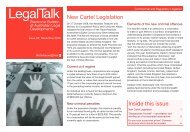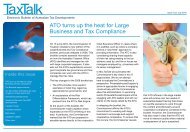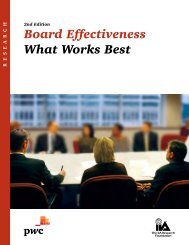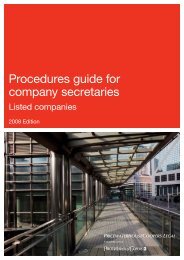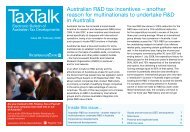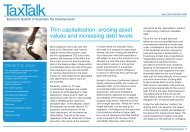How do we rebuild shareholder trust on executive pay
How do we rebuild shareholder trust on executive pay
How do we rebuild shareholder trust on executive pay
You also want an ePaper? Increase the reach of your titles
YUMPU automatically turns print PDFs into web optimized ePapers that Google loves.
Appendix 1: Productivity Commissi<strong>on</strong> final<br />
report <strong>on</strong> <strong>executive</strong> remunerati<strong>on</strong><br />
Productivity Commissi<strong>on</strong><br />
recommendati<strong>on</strong>s<br />
What this means / PwC view<br />
. Prohibit key management pers<strong>on</strong>nel<br />
(KMP) (includes directors) voting <strong>on</strong><br />
remunerati<strong>on</strong> reports<br />
– Amend Corporati<strong>on</strong>s Act to prevent<br />
KMP from voting their shares <strong>on</strong><br />
remunerati<strong>on</strong> reports and any<br />
resoluti<strong>on</strong>s related to those reports.<br />
• Mainly impacts organisati<strong>on</strong>s for companies where the KMP have<br />
significant shareholdings. Where the KMP own the majority of<br />
shares, the situati<strong>on</strong> could arise where remunerati<strong>on</strong> policies are<br />
being determined by the minority of <str<strong>on</strong>g>shareholder</str<strong>on</strong>g>s which PwC <str<strong>on</strong>g>do</str<strong>on</strong>g>es<br />
not believe is appropriate.<br />
• PwC believe this recommendati<strong>on</strong> is better incorporated into<br />
the ASX Guidelines rather than being incorporated into the<br />
Corporati<strong>on</strong>s Act. This sends the message that it is best practice<br />
for KMP not to vote their shares <strong>on</strong> remunerati<strong>on</strong> reports,<br />
ho<str<strong>on</strong>g>we</str<strong>on</strong>g>ver it also gives companies the flexibility not to comply<br />
with this requirement if they believe it is not appropriate for their<br />
circumstances.<br />
5. Prohibit <strong>executive</strong>s hedging equity<br />
– Amend the Corporati<strong>on</strong>s Act to<br />
prohibit <strong>executive</strong>s hedging unvested<br />
equity or vested equity subject to<br />
holding locks.<br />
• The prohibiti<strong>on</strong> of hedging unvested equity should not be a major<br />
issue for most companies as many already prohibit this practice.<br />
• The prohibiti<strong>on</strong> of hedging vested equity subject to holding locks<br />
should also not be a major issue, ho<str<strong>on</strong>g>we</str<strong>on</strong>g>ver PwC’s view is that<br />
<strong>executive</strong>s should be able to hedge this equity if they wish to <str<strong>on</strong>g>do</str<strong>on</strong>g><br />
so. This is because <strong>on</strong>ce the equity has vested, the <strong>executive</strong> is<br />
absolutely entitled to it and, subject to trading restricti<strong>on</strong>s and<br />
company policy, it is similar to other pers<strong>on</strong>al investments.<br />
6. Prohibit KMP (including directors) voting<br />
undirected proxies <strong>on</strong> remunerati<strong>on</strong><br />
reports<br />
– Amend the Corporati<strong>on</strong>s Act and<br />
relevant ASX listing rules to prohibit<br />
KMP from voting undirected proxies<br />
<strong>on</strong> remunerati<strong>on</strong> reports and any<br />
resoluti<strong>on</strong>s related to those reports.<br />
• Implementati<strong>on</strong> will likely prove challenging; undirected proxies<br />
could represent a large number of potential votes <strong>on</strong> remunerati<strong>on</strong>related<br />
issues.<br />
. The Corporati<strong>on</strong>s Act should be<br />
amended to require proxy holders<br />
to cast all of their directed proxies<br />
<strong>on</strong> remunerati<strong>on</strong> reports and any<br />
resoluti<strong>on</strong>s related to those reports.<br />
• Implementati<strong>on</strong> may prove challenging.<br />
8. Improve informati<strong>on</strong> c<strong>on</strong>tent of<br />
remunerati<strong>on</strong> reports to include:<br />
– a plain English summary statement of<br />
companies’ remunerati<strong>on</strong> policies;<br />
– actual levels of remunerati<strong>on</strong> received<br />
by the individuals named in the report<br />
• Many companies already spend c<strong>on</strong>siderable time trying to make<br />
their remunerati<strong>on</strong> reports as readable as possible. The challenges<br />
come from trying to comply with the Corporati<strong>on</strong>s Act and<br />
Accounting Standards mandated disclosures while attempting to<br />
present informati<strong>on</strong> <str<strong>on</strong>g>shareholder</str<strong>on</strong>g>s would like to see.<br />
• Actual realised levels of reward will require careful definiti<strong>on</strong> to<br />
ensure disclosures have been made using similar principles. There<br />
– total company shareholdings of the<br />
are also real challenges in relati<strong>on</strong> to the timing of the valuati<strong>on</strong><br />
individuals named in the report.<br />
– eg is it at the earliest vesting point, when the holding lock is<br />
The Australian Government should released or when the shares are sold?<br />
establish an expert panel under the<br />
• Revising the Corporati<strong>on</strong>s Act and regulati<strong>on</strong>s to improve the<br />
auspices of the Australian Securities<br />
informati<strong>on</strong> c<strong>on</strong>tent of remunerati<strong>on</strong> reports is complex. This is<br />
and Investment Commissi<strong>on</strong> to advise<br />
due to the multitude of stakeholders, their different informati<strong>on</strong><br />
it <strong>on</strong> how best to revise the architecture<br />
needs and the desire to keep remunerati<strong>on</strong> reports as simplistic<br />
of secti<strong>on</strong> 300A of the Corporati<strong>on</strong>s Act<br />
and easy to understand as possible. PwC therefore agrees with<br />
2001 and the relevant regulati<strong>on</strong>s to<br />
the Productivity Commissi<strong>on</strong> that an expert panel should be<br />
support these changes.<br />
established to c<strong>on</strong>sider these issues.<br />
48<br />
| PricewaterhouseCoopers Executive Remunerati<strong>on</strong> – Fourth Editi<strong>on</strong> 2010




